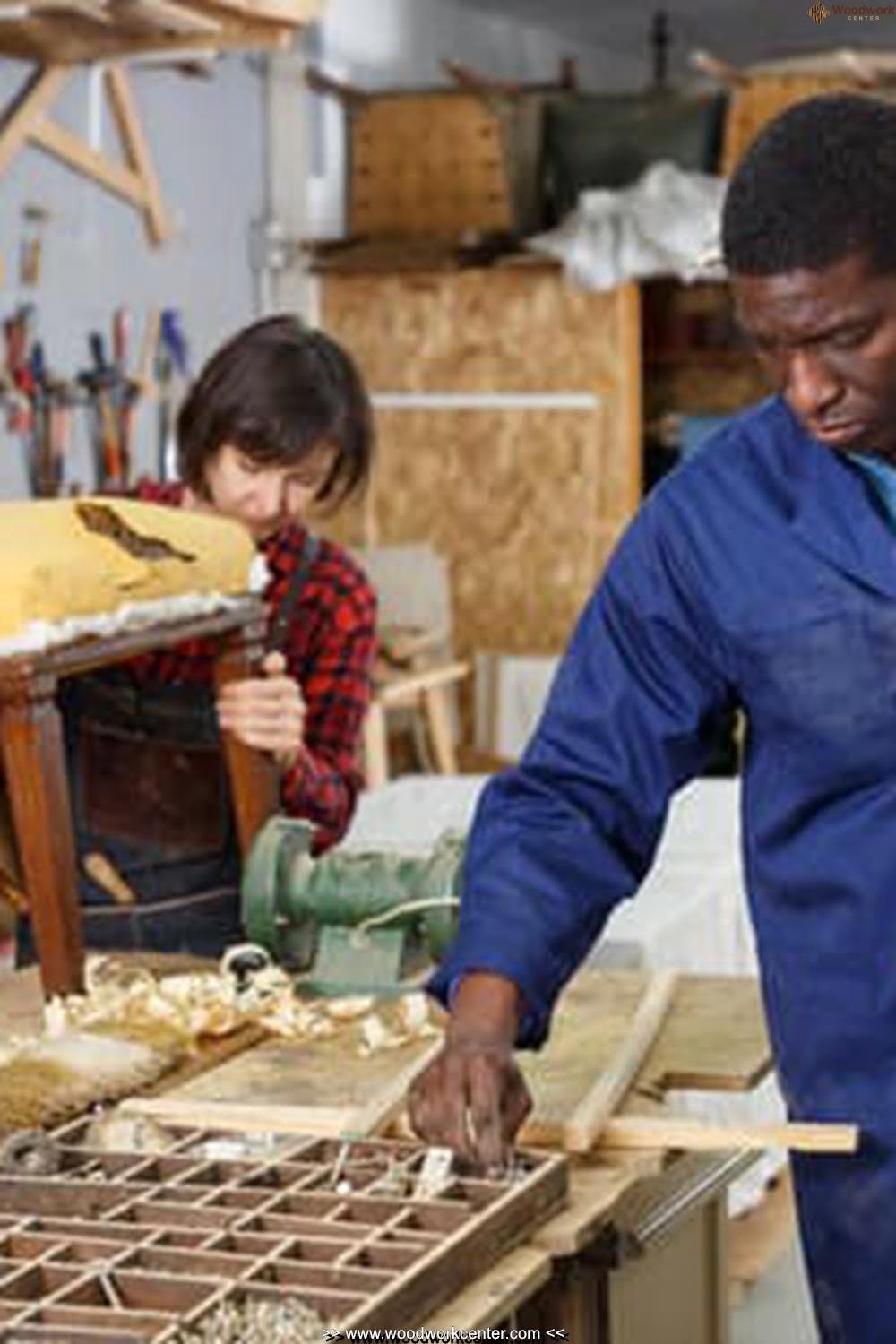Woodworking is a craft that has been passed down through generations, with the creation of beautiful and functional objects from wood. Woodworking shops are crucial spaces where this time-honored craft can be practiced and perfected. If you have an interest in working with wood and want to dive into the world of woodworking, this article will guide you on how to start working in a woodworking shop.
A woodworking shop serves as a sanctuary for artisans and enthusiasts alike. It’s a place where creativity comes to life, where ideas take form, and where skills are honed. Whether you dream of crafting intricate furniture or simply enjoy the satisfaction of shaping wood with your own hands, a woodworking shop provides the necessary space, tools, and resources to turn those aspirations into reality.
To begin your journey in a woodworking shop, it is essential to have a basic understanding of the tools and equipment required. This knowledge will help you navigate the vast array of options available and ensure that you have the essentials needed to get started. From hand tools like chisels and saws to power tools such as drills and sanders, acquiring the right tools is crucial for efficiency and precision in your projects.
In summary, this introductory section highlights the importance of woodworking shops as spaces for creative expression and skill development. It also emphasizes the necessity of understanding basic tools and equipment when starting out in a woodworking shop.
By providing an overview of these key points, readers are prepared for what lies ahead in terms of exploring safety measures, getting started in their own woodworking shop, improving their skills, stocking essential materials and supplies, organizing their workspace efficiently, seeking opportunities for collaboration and learning, as well as advancing their woodworking career with continuous growth.
Understanding the Basics
When starting to work in a woodworking shop, it is crucial to have a good understanding of the essential tools and equipment needed for the job. These tools not only make the work easier but also ensure that you can achieve accurate and high-quality results. Here are some of the key tools and equipment that every woodworking shop should have:
- Power Tools: Power tools play a significant role in woodworking projects, as they can save time and effort. Some essential power tools include a table saw, miter saw, band saw, circular saw, router, drill press, and power sander. These tools provide versatility and precision when cutting, shaping, and sanding wood.
- Hand Tools: While power tools are essential, hand tools are just as crucial for finer tasks that require more control and accuracy. Some must-have hand tools include chisels (various sizes), hand saws (crosscut and rip), planes (block plane or bench plane), files (flat or round), clamps (various sizes), measuring tape, marking gauges, and a set of quality screwdrivers.
- 3.Workbenches and Workstations: A sturdy workbench is an essential piece of equipment for any woodworking shop. It provides a stable surface for working on various projects. Additionally, having well-organized workstations with enough space for tools and materials will help improve efficiency throughout your projects.
Investing in these essential tools will set you up for success in your woodworking endeavors. However, remember that safety should always come first when working with these powerful instruments.
It is important to note that acquiring all these tools may seem overwhelming at first due to the initial cost involved. However, it’s worth investing in quality tools as they offer better performance and durability over time. Start by purchasing basic tools and gradually add to your collection as you gain more experience in woodworking.
Understanding the basics of essential tools and equipment will lay a solid foundation for your woodworking journey. However, it is also crucial to learn about safety measures in a woodworking shop to prevent accidents and injuries, as discussed in the next section.
Safety First
When working in a woodworking shop, safety should always be the top priority. Woodworking involves the use of various tools and equipment that can cause serious injuries if not used properly. Therefore, it is crucial to understand the importance of safety measures and take necessary precautions to stay protected.
One of the most important safety measures in a woodworking shop is wearing personal protective equipment (PPE). This includes safety glasses or goggles to protect your eyes from flying debris, a dust mask or respirator to prevent inhalation of harmful dust particles, and ear protection to reduce noise levels. Additionally, it is recommended to wear gloves to protect your hands from splinters and cuts.
Another essential safety measure is ensuring that all tools are in good working condition. Regularly inspecting and maintaining tools can help prevent accidents caused by faulty equipment. It is also important to use each tool for its intended purpose and follow proper operating procedures. Misusing tools can lead to injuries or damage to the tool itself.
Furthermore, keeping the woodworking shop clean and organized can greatly contribute to safety. Cluttered workspaces increase the risk of tripping hazards, so it is important to keep walkways clear at all times. Storing tools properly after use also prevents accidents caused by falling objects.
| Common Safety Measures in a Woodworking Shop | Importance |
|---|---|
| Wearing personal protective equipment (PPE) | To protect from injuries caused by flying debris, dust particles, and loud noise |
| Regularly inspecting and maintaining tools | To prevent accidents caused by faulty equipment |
| Using each tool for its intended purpose and following proper operating procedures | To reduce the risk of injuries or damage to the tool |
| Keeping the woodworking shop clean and organized | To minimize tripping hazards and prevent accidents caused by falling objects |
Getting Started
To begin working in a woodworking shop, there are several important steps you should take. These steps will help ensure that you have a solid foundation in woodworking and are ready to start creating your own projects.
Step 1: Educate Yourself
Before diving into the world of woodworking, it’s important to educate yourself about the craft. There are numerous resources available that can help you learn the fundamentals of woodworking, such as books, online tutorials, and video courses. Take advantage of these resources to familiarize yourself with basic techniques, terminology, and safety practices.
Step 2: Get the Right Tools
Having the right tools is essential for any woodworker. Start by investing in basic hand tools such as a chisel set, coping saw, mallet, and hand plane. Additionally, you will need power tools like a table saw, drill press and router. Consider starting with a small collection of essential tools and gradually expand your collection as you gain experience.
Step 3: Set Up Your Workspace
Next, it’s time to set up your woodworking shop. Choose a space that is well-ventilated and has good lighting. Make sure there is enough room for your workbench and tool storage cabinets. Organize your tools in a way that makes them easily accessible while minimizing clutter. Remember to include safety equipment such as dust masks, safety goggles, and ear protection.
Once your workspace is set up, consider adding some additional features like a pegboard for tool storage or a workbench with built-in storage shelves for added convenience.
By following these steps to get started in a woodworking shop, you’ll be well on your way to becoming a skilled woodworker. Remember to start small with simple projects and practice regularly to build your skills over time.
Mastering the Craft
Woodworking is a skill that takes time and practice to master. In order to improve your woodworking skills in a shop, it’s important to focus on both the technical aspects of the craft as well as developing your artistic eye. This section will provide you with some tips and techniques to help you improve your woodworking skills and create beautiful pieces in your woodworking shop.
Study and Learn from Other Woodworkers
One of the best ways to improve your woodworking skills is by learning from others who have mastered the craft. Seek out experienced woodworkers and join woodworking groups or forums where you can connect with fellow enthusiasts. By observing their techniques, asking questions, and even working on projects together, you can gain valuable insights and guidance that will help advance your own skills.
Experiment with Different Techniques
Expanding your skill set by experimenting with different techniques is another way to enhance your woodworking abilities. Try new joinery methods such as dovetail or mortise-and-tenon joints, explore different types of wood finishes, or challenge yourself with more intricate designs. Don’t be afraid to step out of your comfort zone and take on projects that push you to learn new skills.
Practice Patience and Precision
Patience and precision are two key elements in mastering the craft of woodworking. Take the time to carefully plan each project, ensuring accurate measurements and precise cuts. Remember, rushing through a project often leads to mistakes that can negatively impact the final result. Practice patience in every step of the process, from choosing the wood to applying finishes.
Continuously Educate Yourself
Woodworking is a field where there’s always something new to learn. Stay updated with industry trends, tools, technologies, and techniques by reading books, watching instructional videos, attending workshops or seminars held by experts in the field. By continuously educating yourself, you’ll expand your knowledge and keep up with the latest advancements in woodworking.
Learn from Mistakes
Mistakes happen, and they can provide valuable learning opportunities. Rather than getting discouraged when something doesn’t go according to plan, take the time to analyze and learn from your mistakes. Reflect on what went wrong and how you can avoid similar errors in future projects. Embrace the learning process and use those experiences to improve your skills.
By following these tips and techniques, you can continue to develop and refine your woodworking skills in a shop environment. Remember that mastering any craft takes time, patience, and dedication. With practice, persistence, and a commitment to continuous improvement, you’ll be able to create beautiful pieces of woodwork in your woodworking shop.
Stocking Your Shop
When it comes to working in a woodworking shop, having the right materials and supplies is essential. Stocking your shop with the necessary items will not only make your work more efficient but also contribute to the quality of your craftsmanship. From basic tools to specific materials, here are some essential woodworking supplies that every woodworker should have on hand.
Basic Hand Tools
First and foremost, a woodworking shop should be equipped with a set of basic hand tools. These tools include a measuring tape, carpenter’s square, chisels, mallets, screwdrivers, hammers, and marking gauges. These tools will assist you in measuring accurately, marking lines precisely, shaping wood, driving screws or nails, and much more. Investing in high-quality tools will ensure they last for years and provide you with the best results.
Power Tools
In addition to hand tools, power tools play a crucial role in any woodworking shop. Power tools can enhance productivity by reducing the effort required for certain tasks.
Essential power tools include a table saw for cutting large pieces of wood with precision, a router for creating intricate designs or shaping edges, a drill press for drilling holes accurately at specific depths, and a planer for smoothing rough stock or resizing lumber. While these power tools can be expensive upfront investments, they are worth it when it comes to improving efficiency and achieving professional-looking results.
Safety Equipment
Alongside acquiring the necessary hand and power tools for your woodworking shop, safety should always be a top priority. Investing in proper safety equipment is crucial to prevent accidents and injuries while working with wood. Some essential safety gear includes safety glasses or goggles to protect your eyes from flying debris or dust particles generated during cutting or sanding processes.
Ear protection such as earplugs or earmuffs is necessary to reduce the risk of hearing damage from loud power tools. Additionally, wearing a dust mask or respirator will protect your lungs from inhaling harmful particles and fumes produced when working with certain types of wood, varnishes, or finishes.
By stocking your shop with these essential woodworking materials and supplies, you will be well-prepared to take on various projects with confidence. Having the right tools on hand will not only make your work more efficient but also contribute to the quality of your woodworking craftsmanship. Remember to prioritize safety by investing in appropriate safety equipment to protect yourself from potential hazards in the workshop.
Navigating the Woodworking Shop
A woodworking shop can quickly become chaotic if not properly organized and maintained. To ensure a clean and efficient workspace, it is important to have a systematic approach to organizing tools, materials, and workstations. By implementing effective organizational strategies, woodworkers can save time, reduce frustration, and improve overall productivity in the shop.
To begin organizing your woodworking shop, start by decluttering your workspace. Remove any items that are not essential to your daily work or that have been unused for a long period of time. This will create more room for necessary tools and materials, making it easier to find what you need when you need it.
Next, establish designated areas for different types of equipment and materials. Create separate stations for cutting, sanding, assembly, and finishing processes. This will help streamline your workflow as you can easily move from one station to another without wasting time searching for tools or supplies.
In addition to designated stations, another useful organizational strategy is labeling. Invest in labels or use clear containers to store small tools, fasteners, and other small parts. This will prevent the loss of these items and make them easily accessible when needed.
Organizational aids such as pegboards, tool racks, and shelves are also valuable additions to a woodworking shop. Utilize these resources to hang frequently used tools or store larger items like clamps or power tools. This not only keeps the workshop tidy but also ensures that everything has its designated place.
Furthermore, maintaining a clean working environment is crucial for safety reasons as well as overall efficiency. Regularly sweep or vacuum the floors of sawdust and debris to prevent accidents caused by slipping or tripping hazards. Keep workbenches clean by wiping them down after each project to remove any lingering dust or dirt.
Proper disposal of waste materials is another important aspect of maintaining cleanliness in the woodworking shop. Have designated containers for sawdust, wood scraps, and other waste products. Dispose of these materials in a responsible manner to prevent fire hazards and environmental pollution.
By implementing these organizational strategies and maintaining cleanliness in your woodworking shop, you can create a productive and enjoyable workspace. Having a clean and efficient workshop will not only enhance the quality of your work but also contribute to a positive woodworking experience overall.
Collaborating and Learning
One of the best ways to enhance your woodworking skills and network with fellow woodworkers is by joining woodworking workshops and classes. These opportunities not only provide you with valuable knowledge and techniques, but they also give you the chance to connect with others who share your passion for woodworking.
Woodworking workshops are usually held in a shop or studio setting, where participants can have hands-on experiences under the supervision of a skilled instructor. These workshops are typically designed to focus on specific aspects of woodworking, such as joinery techniques, furniture making, or woodturning. By participating in these workshops, you can gain new skills and insights that will help you improve your craftsmanship.
In addition to workshops, taking woodworking classes at a local community college or vocational school can provide you with a more comprehensive education in woodworking. These classes often cover various topics ranging from basic woodworking principles to advanced techniques. Furthermore, enrolling in a class allows you to learn from experienced instructors who can provide valuable guidance and feedback on your work.
Moreover, collaborating and learning from other woodworkers in these settings can be invaluable. By interacting with fellow enthusiasts who may have different backgrounds and experiences, you can learn new perspectives on woodworking and exchange ideas. Additionally, networking within the woodworking community can potentially lead to future collaborations or job opportunities.
To summarize, joining woodworking workshops and classes is an excellent way to enhance your skills, expand your knowledge base, network with other passionate woodworkers, and open doors for further opportunities in the field. Whether it’s attending weekend workshops or enrolling in long-term classes, taking advantage of these collaborative learning environments will undoubtedly contribute to your growth as a woodworker.
| Benefits | Examples |
|---|---|
| Enhance Skills | Learning advanced joinery techniques |
| Network with Woodworkers | Making connections with experienced craftsmen |
| Gain New Perspectives | Exchange ideas and learn from others’ experiences |
| Explore Collaborations | Potential partnerships for future projects or job opportunities |
Advancing Your Woodworking Career
In conclusion, working in a woodworking shop provides endless opportunities for growth and continued learning in the woodworking industry. By following the steps outlined in this article, you can begin your journey in this rewarding field and start honing your woodworking skills.
One of the best ways to advance your woodworking career is by continuously seeking out opportunities for growth and learning. Joining woodworking workshops and classes not only allows you to enhance your skills but also allows you to network with fellow woodworkers. These connections can lead to collaborations, mentorships, and even job opportunities that can help propel your career forward.
Additionally, it is important to stay updated on the latest techniques, tools, and trends in the woodworking industry. This can be achieved by staying connected with professional organizations, subscribing to industry publications, attending trade shows, or participating in online forums and communities. By staying current with the industry, you can ensure that your skills remain relevant and competitive.
Lastly, remember that advancement is not solely limited to technical skills. Developing strong interpersonal skills such as effective communication, teamwork, and problem-solving can greatly benefit your woodworking career. As you progress in your career and potentially take on leadership roles or start your own woodworking business, these soft skills become increasingly important.
Frequently Asked Questions
How do I start a woodworking career?
Starting a woodworking career requires a combination of passion, skill development, and practical knowledge. Firstly, it is important to acquire basic woodworking skills through classes, workshops, or online tutorials. This will provide you with a foundational understanding of different woodworking techniques and tools. Additionally, investing in quality tools and equipment is crucial for both safety reasons and to produce high-quality work.
Building a portfolio of your projects is also essential to showcase your skills to potential clients or employers. Networking within the woodworking community can help you gain exposure and open doors for apprenticeships or employment opportunities. It is important to continuously refine your skills by taking on challenging projects and learning from experienced woodworkers. With dedication and perseverance, starting a woodworking career can be an exciting journey.
Can you really make money woodworking?
Yes, it is definitely possible to make money from woodworking. However, like any business or career, success in woodworking does not come overnight; it requires dedication and hard work. To make money in this field, you need to identify your target market and develop a solid business plan.
Offering unique products or specializing in niche areas can help differentiate yourself from others in the industry. Building a reputation for producing high-quality craftsmanship will attract customers who are willing to pay a premium for handmade wooden goods. Additionally, diversifying your income streams by offering custom commissions, teaching woodworking classes, selling plans or templates online, or even partnering with local businesses for collaborations can increase your earning potential.
Can you make a career out of woodworking?
Absolutely, you can make a full-time career out of woodworking if you are passionate about the craft and willing to put in the necessary effort. A successful woodworking career involves more than just creating beautiful pieces; it requires a comprehensive understanding of various aspects such as marketing, project management, pricing strategies, and customer service. Building strong relationships with clients based on trust and satisfaction plays a fundamental role in establishing yourself as a reputable woodworker in the long run.
Continuous learning is also critical since there are always new techniques, materials, and woodworking trends to stay updated with. While there may be challenges along the way, such as fluctuations in demand or sourcing sustainable materials, with dedication and a business mindset, woodworking can become a fulfilling and sustainable career choice.

Hi everyone! I’m a woodworker and blogger, and this is my woodworking blog. In my blog, I share tips and tricks for woodworkers of all skill levels, as well as project ideas that you can try yourself.





